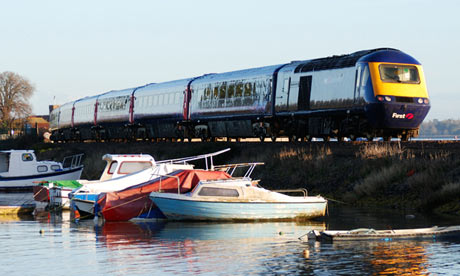Battery-powered intercity trains possible, says government study
Research for Department of Transport reveals trains could travel 600 miles on single charge if fossil fuel prices trigger demand

Research indicated battery-powered trains could travel up to 600 miles on a single charge if fuel costs and environmental issues required it. Photograph: Dual Aspect/Alamy
If for some an intercity express will always resemble an oversized toy then this is perhaps just one stage further towards an extravagant childhood dream: a battery-powered train capable of travelling 600 miles on a single charge.
Such a technology is now possible, if not immediately likely to pull into a local station, according to government-commissioned research. The study was ordered by the Department for Transport with the significantly more serious purpose of examining ways trains could run on difficult-to-electrify lines if fossil fuel prices and environmental worries make diesel power too expensive.
The experts, working on behalf of the Transport Research Laboratory, looked into two options, the first of which would see a relatively small battery – still weighing up to two tonnes – with a shorter range, which would be mechanically swapped at stations.
The other notion was seen as more feasible: a single, eight-tonne battery, which could propel a train service for around 600 miles at a time, using a super capacitor or flywheel for the varying power requirements of the route.
Using digital models of real, if shorter, rail trips – Stratford-upon-Avon to Birmingham, for example – the experts were able to model how such a train could run. The conclusion – battery power is "a feasible option for providing electric traction on parts of the rail network where full route electrification is not viable".
The big caveat, one known all too well by owners of electric cars, is the lifespan of the hugely expensive battery, with the eight-tonne rail version anticipated to cost around £0.5m a piece. While a diesel train would cost around £160,000 a year to run on a daily 600-mile service, the battery version would be more than £240,000 a year, of which £150,000 alone would be set aside for battery replacement.
Diesel prices would need to more than double for battery-only trains to become viable, said John Molyneux from the rail arm of the Lloyd's Register group, who led the report.
"I don't think we'll see these trains in my lifetime," he said. "But they may eventually come, out of necessity rather than of choice. It would be because of fuel prices and the environment."
Battery technology could improve, but less quickly than some people thought, he said: "It's all relative. Lithium ion has been around for 20-odd years and there isn't much that's better than that. And it's still got its problems. With any next-generation batteries you're still limited by electro-chemistry, which is a big limitation. You can't get much better than we have now."
However, one more immediate use of the technology could be smaller batteries to propel trains through short sections of difficult-to-electrify routes.
"The problem with electrification is things like tunnels, bridges and stations," he said. "They're the killers because you've got to break the overhead and you can't have a continuous run.
"One thing we looked into was whether we could supply enough power on a small battery just to get you through the critical bits. Like an electric-electric hybrid. But there's got to be an awful lot of will driving even that."
No hay comentarios:
Publicar un comentario